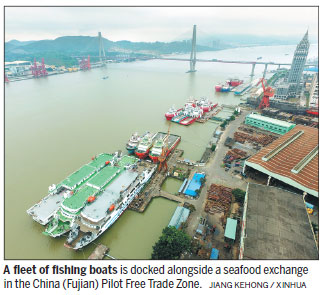

Fujian's development is booming in the wake of effective reform carried out by the East China province's economic and industrial zones.
Xiamen, host city of the BRICS Summit, is a part of the China (Fujian) Pilot Free Trade Zone, which is helping to spearhead the reform.
In the past three years, the zone has launched a total of 134 measures in administrative innovation and reform to better serve startup businesses, 49 of which were the first to be rolled out across the whole country, according to authorities.
The Fuzhou part of China (Fujian) Pilot Free Trade Zone was established in 2015. It became an example of the administrative reform carried out by the province after it led the way in initiating 11 batches of 136 initiatives to make institutions more efficient, simplifying the administrative process, as well as better facilitating the area for trade and investment.
By the end of 2017, there were 28,696 new businesses in the area, with a combined registered capital of 485 billion yuan ($75.76 billion).
Last year, the total trade volume of the Fuzhou section of the free trade zone hit 26 billion yuan, a year-on-year increase of 44.4 percent.
Pingtan, in eastern Fujian, is the closest island county on the mainland to Taiwan.
It has been actively preparing itself to be a common homeland for cross-Straits residents since 2015, when it was also included in the China (Fujian) Pilot Free Trade Zone, with an emphasis on cross-Straits trade and communication.
Investment made in the zone is continuing to expand in the areas of e-commerce, creative culture, logistics, tourism and financial services, making them part of a new growth engine to promote the province's economic development.
Since the Pingtan part of the zone was established, a total of 7,108 new businesses have been registered in the place, consisting of a total registered capital of 329 billion yuan.
The zone has been pushing for institutional reform and attracting business startups since its establishment in 2015.
Data from a survey carried out by a third party organization show that 90.8 percent of the local enterprises agree that the zone has made satisfactory measures in the reform and 91.3 percent of them think positively about the business environment.
By the end of March this year, the total number of new businesses has reached 69,183, with a registered combined capital of 1.5 trillion yuan. Along with the reform in administration and development in economic construction, the improvement of Fujian's ecological system has also not lagged behind.
As the first province to be selected as a national-level ecological civilization testing area, Fujian ranked second of all Chinese provinces in the overall evaluation of ecological civilization construction in 2016.
Pioneering measures such as garbage classification have been adopted and repeated throughout the province.
Through enforcing stringent environmental law and implementing solid supervision, environmental protection projects have shown effect in a wide range of environmental issues.
According to authorities, the proportion of the 12 main rivers in the province with excellent water quality is 95.8 percent; the proportion of days with excellent air quality in Fujian's nine prefecture-level cities reached 96.2 percent, which is 18.2 percentage points higher than the national average. The forest coverage rate is 65.95 percent and ranked best in the country.
Last year, Fujian's GDP exceeded 3 trillion yuan for the first time. For its next move, the province will pave the way for urbanization projects, improve its infrastructure and gather more industrial projects, as well as optimize its institutional system.
liyou@chinadaily.com.cn
